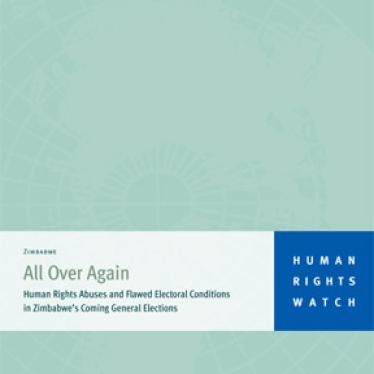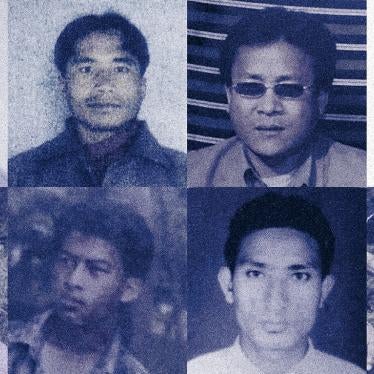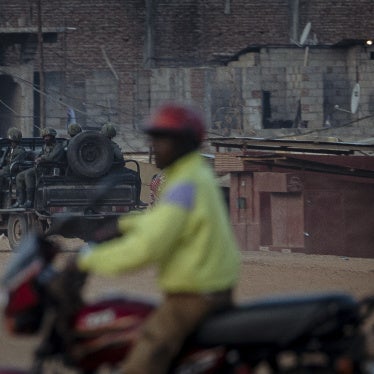The government claims that changes to Zimbabwe's election laws will make Saturday's voting, for president, parliament, senate and local councils, more fair. One change was that police were prevented from coming within 100 metres of polling stations, but last week President Mugabe used his powers to reverse the rule. Police will now be allowed to "assist" illiterate and disabled voters in polling booths. Even before the weakening of such safeguards, it was inconceivable that the elections would be free and fair.
If a local councillor puts you on the list, the woman explained, you get government handouts of mealie meal (maize flour) and farm equipment such as ploughs and tractors. Those who could not prove loyalty to Mr Mugabe's Zanu-PF get nothing. "The mealie meal is only being accessed by us," she said.
With Zimbabwe's economy in freefall - inflation is now officially above 100,000 per cent - food has become a powerful tool for the government and the ruling party. An elderly man in Marange, Manicaland province, told me: "If you show yourself to support the opposition, you will starve."
Encounters such as these help to show why, despite Mr Mugabe being opposed by a challenger from within Zanu-PF, Simba Makoni, as well as Morgan Tsvangirai of the opposition Movement for Democratic Change (MDC), Saturday's voting is expected to result in another coronation for the man who has ruled the country since independence in 1980.
Between last September and this month, I spent seven weeks in Zimbabwe and visited all 10 provinces, interviewing scores of people from farmers to teachers, housewives to market traders, to produce a report for Human Rights Watch, which was published last week. I heard similar stories nearly everywhere I went.
In the capital, Harare, at the offices of an organisation that treats and counsels victims of violence in Zimbabwe, a young woman sat facing me. Avoiding my eye and speaking in a barely audible voice, she described how the police beat her after she took part in a march, organised by a group called Restoration of Human Rights Zimbabwe, a month earlier.
"A policeman hit me on the nose with his fist and then hit me with his baton on my back and on my feet," she said. "It was raining; they took us outside and made us lie down in the dirty water, and made us crawl as we were being beaten. In the car they were hitting us again and made us put our dirty shoes in our mouths. At the station they told us, 'You will never take the President out of power. It will never happen'."
The President himself seemed in no doubt about the result when he warned the opposition on Friday that any outbreak of violence if they lost the election, such as happened in Kenya, would be crushed. "If Tsvangirai and his group have such plans, they must stand warned," he told a rally in his home area of Zvimba, north-west of Harare. "That will never happen here, never, never. We will never allow it. We have enough security forces to handle that."
The government claims that changes to Zimbabwe's election laws will make Saturday's voting, for president, parliament, senate and local councils, more fair. One change was that police were prevented from coming within 100 metres of polling stations, but last week President Mugabe used his powers to reverse the rule. Police will now be allowed to "assist" illiterate and disabled voters in polling booths. Even before the weakening of such safeguards, it was inconceivable that the elections would be free and fair. Voters had little knowledge about the new and complex electoral process; on state-run television and radio I heard little about the opposition, and read even less in state-run newspapers.
In Bindura, north-east of the capital, I saw two men wearing MDC T-shirts, something that would have been unheard of three years ago. Bindura is a ruling party stronghold, and in the past was a no-go area for the opposition. Did this signal greater tolerance? Any change was superficial, I was told by a local human rights activist. MDC candidates could not campaign openly or hold meetings without being subjected to threats by ruling party supporters, and had to do their campaigning at night. Most people in these areas are afraid to attend opposition rallies.
Sitting in a car by the side of a dam in Masvingo province, south-eastern Zimbabwe, I talked in October to five men ranging in age from their twenties to their fifties. They were not optimistic about the election, remembering the irregularities and high levels of violence committed by ruling party supporters and state security forces at previous polls. One, a teacher, said ruling party youths attacked him after they heard him telling people to register to vote. "They hit me with clubs," he said. "They displayed me before the rest of the school, and now they are keeping an eye on me." He showed me the scars on his head. He reported the case to police, but the perpetrators were never caught. Two other men, also teachers, told me they too had been threatened with violence.
This month I returned to Masvingo to ask the same group of men about electoral conditions. Things were relatively calm, they said, but the government was trucking in food to its rallies and giving it to loyal party supporters. Despite the relative peace, they did not believe that the elections would be free and fair. "There is too much intimidation," one of them said. "People have little confidence in the election process," said another.
The government has banned election observers from many countries, but is allowing a team from neighbouring states belonging to the Southern African Development Community (SADC) to monitor the voting. I asked the men whether they thought the presence of these observers would help prevent further abuses, intimidation or fraud. One of the teachers shook his head. "It doesn't matter what they do," he said. "If the ruling party wins, it simply means that those of us who are believed to have voted for the opposition will starve, be beaten or chased out of our homes."







